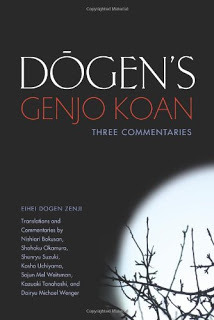Dogen's Genjo Koan: Three Commentaries
 The fine folks at Counterpoint Press sent me a copy of Dogen's Genjo Koan: Three Commentaries for my review. So here goes.
The fine folks at Counterpoint Press sent me a copy of Dogen's Genjo Koan: Three Commentaries for my review. So here goes.First off, the by-line on this thing is a doozy. Here's what it says under the title:
EIHEI DOGEN ZENJI
Translations and
Commentaries by
Nishiari Bokusan,
Shohaku Okamura,
Shunryu Suzuki,
Kosho Uchiyama,
Sojun Mel Weitsman.
Kazuaki Tanahashi, and
Dairyu Michael Wenger
Phew!
You always know the extent to which a movie is going to be a piece of garbage by the number of names in the writing credits. One writer can make a good movie with a specific point of view and something interesting to say. When movies are written by committee the committee always succeeds in removing anything worthwhile about the story and replacing it with whatever they've agreed on will appeal to, as well as avoid offending, the greatest number of people.
This book is the product of a large Zen institution. I almost wrote that it was the product of the San Francisco Zen Center (SFZC). But the inclusion of material by Kosho Uchiyama and Shohaku Okamura widens things even further. Uchiyama and Okamura stem from the same root lineage as the folks at SFZC, but do not belong to that institution itself. Because of its association with a big institution I was a little worried whether I'd be able to give this book a good review.
My problem with a lot of the stuff that comes out of SFZC these days is that it tends to be watered down. This was the trouble with their edition of Dogen's Shobogenzo (Treasury of the True Dharma Eye: Zen Master Dogen's Shobo Genzo). It's not that it's a bad translation. In fact it's one of the best around. But it's also a translation by committee. That committee sat together and worried about a lot of fairly ridiculous "problems" with the text such as whether or not the phrase usually rendered as "kingly bodhi tree" might be considered sexist. Which is the sort of thing you'd expect a bunch of uptight middle class liberals from San Francisco to wring their hands about. Thus in a number of areas of the text, rather than giving you what Dogen actually said, they give you what a bunch of uptight middle class liberals from San Francisco are comfortable with him saying. Fortunately they generally restrict themselves to fairly innocuous changes like making "kingly bodhi tree" into "royal bodhi tree," which I admit is pretty much the same thing. But still, the flavor of their translation is Rice-a-Roni (the San Francisco treat) rather than the kind of plain boiled rice Dogen would have served you.
Anyway, that's not what's going on with Dogen's Genjo Koan: Three Commentaries. So just forget I said any of that stuff. The reason there are so many authors in this book is because it is a compilation of three commentaries, each of which has two or three authors or editors attached. The first is by Nishiari Bokusan, who was the teacher of Shunryu Suzuki's teacher Kishizawa Ian. This is translated by Kazuaki Tanahashi and Mel Weitsman. Tanahashi is Japanese and speaks English but is not an ordained Zen teacher. Weitsman is American and does not speak Japanese but is an ordained Zen teacher. So one can guess that Tanahashi is responsible for the actual translation into English while Weitsman made it sound more Zen and that the two of them hashed out the translation to make sure the final piece was true to the original. Though I can't help wondering if they also removed any offending sexism or suchlike in the process.
 The second commentary is attributed to Shunryu Suzuki, author of Zen Mind, Beginner's Mind and the first abbot of the San Francisco Zen Center. But Suzuki himself never prepared any commentary on Genjo Koan as such, at least not for publication. He did, however, give a number of lectures on Genjo Koan over a period of six years. So Michael Wenger and Mel Weitsman went through those lectures with the assistance of Jeffrey Schneider and stitched together a Frankenstein monster commentary that reads as if it were a single piece. They did a good job. It's very hard to spot where the sutures and the bolts in the neck are in this version. But, again, I can't help wondering what Suzuki himself would have made of it. I've heard that while he was happy with Zen Mind Beginner's Mind, which was put together in a similar fashion, he thought it was more what his students heard him say than what he actually said. I'd guess he'd feel the same way about this piece.
The second commentary is attributed to Shunryu Suzuki, author of Zen Mind, Beginner's Mind and the first abbot of the San Francisco Zen Center. But Suzuki himself never prepared any commentary on Genjo Koan as such, at least not for publication. He did, however, give a number of lectures on Genjo Koan over a period of six years. So Michael Wenger and Mel Weitsman went through those lectures with the assistance of Jeffrey Schneider and stitched together a Frankenstein monster commentary that reads as if it were a single piece. They did a good job. It's very hard to spot where the sutures and the bolts in the neck are in this version. But, again, I can't help wondering what Suzuki himself would have made of it. I've heard that while he was happy with Zen Mind Beginner's Mind, which was put together in a similar fashion, he thought it was more what his students heard him say than what he actually said. I'd guess he'd feel the same way about this piece.The final commentary is the purest. It was prepared as a single piece by Kosho Uchiyama and then translated by Shohaku Okamura. Okamura was not only a direct student of Uchiyama but is a Japanese Zen monk whose English is at such a high level that he didn't need help in preparing a readable translation. I suppose he had an editor, just like any English speaking author would. But this is still Okamura's own vision of the piece. So even though Uchiyama himself didn't approve it, we can be pretty sure this is very close to how he would have said things if he'd been able to speak English.
That being said, I find Suzuki's portion to be the most readable and easy to understand, while Bokusan's runs a close second. Unfortunately Uchiyama's commentary comes off a little too stilted and scholarly for my taste. This doesn't seem to be Okamura's fault since Okamura's sketch of Uchiyama's life, which precedes the commentary, is highly readable and very warm.
Although Uchiyama's commentary is the most scholarly-sounding of the three, none of these are really scholarly commentaries. A scholarly commentary on Genjo Koan would tell you about Dogen's life, about what was going on in Japan at the time, about Dogen's use of language, about the background of the various quotations he uses, and so on. In this book you get just enough of that stuff to follow along. These are commentaries by Zen practitioners whose main intent was to help other Zen practitioners deal with their practice.
In that, I feel these are very useful for those of us who practice Zen in the West today. Granted all three commentaries are by older Japanese men. But none of these commentaries are so ancient that they feel removed and distant from us the way a really old commentary might. The earliest of the three is Nishiari's, which dates from the early twentieth century. The most recent is Uchiyama's, which dates from the 1970s. They are all, therefore, modern looks at the 800 year old Genjo Koan. Contemporary life even intrudes into the commentaries themselves when Shunryu Suzuki refers to the traffic noises outside the hall in Northern California where he delivered his talks and relates this directly to what Dogen was writing about hundreds of years before cars were invented.
Some might feel this makes the commentaries less valuable since they are so far removed from Dogen's time. One could complain that people so distant from the author's own era can't possibly know what he was talking about. But I don't feel that's the case. It's more important that all three of the commentaries are by practitioners. What's more, like us, these practitioners have to deal with the kinds of things Dogen never had to deal with.
It's funny to me when people act like we, today in the West, have so much more trouble practicing Zen than the folks in Asia hundreds of years ago. In spite of traffic noises and blaring boomboxes, we really have it a lot easier than people in Dogen's time did. They had to deal with wars and famines and political uprisings the likes of which are seldom encountered by any of us these days. The distractions we have to deal with are, admittedly, a lot more attractive and easily available than those of Dogen's time. But our excuse for not practicing is because there are so many more websites to look at and besides there's a guy upstairs practicing Jimi Hendrix licks, rather than because we're about to starve to death since the rice crop failed and the Mongols are burning down the village. It's really no contest. We've got it very cushy by comparison.
The commentaries in this book are by people who understand the unique nature of the distractions to practice contemporary people face. Though they may not be as hip and pop culture savvy as the trash I put out, they're very useful to anyone serious about pursuing Zen practice in our time.
****
Don't forget, if you want to practice some Zen, beginning Sunday January 15th 2012 I will be hosting Zazen every Sunday night at 7 pm at the Akron Shambhala Meditation Center. Maybe I'll even give you my take on Genjo Koan. The address is:
133 Portage Trail Ste. 202
Cuyahoga Falls, Ohio
44221
Published on January 11, 2012 07:04
No comments have been added yet.
Brad Warner's Blog
- Brad Warner's profile
- 595 followers
Brad Warner isn't a Goodreads Author
(yet),
but they
do have a blog,
so here are some recent posts imported from
their feed.



